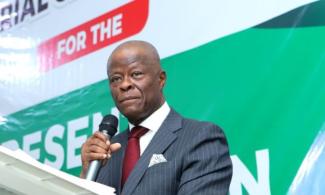
Wale Edun, President Bola Tinubu's Minister of Finance and Coordinating Minister of the Economy, announced that 60 percent of the programme would directly benefit the most vulnerable segments of the population.
The Nigerian government has stated that it is set to launch a cash transfer initiative aimed at supporting 20 million of the country’s poorest citizens.
The initiative is part of a broader strategy to allocate the increased revenue generated during the 2024 fiscal year to social intervention programs designed to improve living standards and address urgent societal needs.
Wale Edun, President Bola Tinubu's Minister of Finance and Coordinating Minister of the Economy, announced that 60 percent of the programme would directly benefit the most vulnerable segments of the population.
Speaking at a panel session titled "Fiscal Reforms for a More Secure Future" during the 30th Nigeria Economic Summit in Abuja, Edun emphasised that the government’s focus on domestic resource mobilisation had resulted in revenue growth, with figures for the first half of 2024 exceeding N9.1 trillion—more than double the N4.06 trillion collected in the same period last year.
“The increased revenue is primarily being used to finance social programmes aimed at mitigating the impact of essential but challenging reforms that have affected the cost of living,” Edun stated.
He also unveiled a comprehensive economic reform agenda intended to tackle inflation, generate job opportunities, and stimulate growth in key sectors of the economy.
According to Ẹdun, “Aggregate government revenue was more than doubled. And that was achieved by applying technology very robustly.
“We have applied technology in a way that essentially reforms the civil service. Rather than waiting for compliance from government ministries, departments and agencies and government companies, we looked at what the rules and regulations were, how much a company was allowed to spend on its revenue, and then how much of its surplus it had to provide to government.
It said “The social investment programme is spearheaded by direct transfers to reach 60 per cent poorest in the population. And right now, 20 million households are being supported directly. And it’s going to rise to, well, 20 million people, four million households so far, and it will rise to 15 million households who will be paid directly by the government.
“That is how President Tinubu’s government is spending the money which is being yielded from better oil production.”
He explained that the government’s focus on agriculture, manufacturing, oil, and housing as vital drivers of Nigeria’s economy.
“We are looking to food production to help bring down inflation,” he explained.
“We aim to make food more available, affordable, and to reduce the cost of living for Nigerians," he added.
He noted that direct cash transfer interventions have already reached 4 million households.
In discussing the oil sector, Edun emphasized its critical role in generating foreign exchange and highlighted the government’s strategic approach to the industry.
He explained that recent reforms had attracted substantial investments, including an additional $10 million from ExxonMobil and other major players in the sector.
“The oil sector is our primary source for foreign exchange and global revenue,” he stated, expressing confidence in continued contributions from both local and foreign investors.
The efforts have spurred Nigerian manufacturers to commit approximately $4.2 billion in investments, enhancing the country’s economic outlook.
The minister also pointed out other initiatives, such as the student loan scheme and consumer credit programs designed to help workers purchase household goods or convert their vehicles to cleaner Compressed Natural Gas fuel.
In agriculture, the government is providing up to N75billion in grants and loans to support one million small and micro enterprises. For larger companies, an additional N75billion is being distributed in tranches of N1billion each at a nine percent annual interest rate, aimed at helping them manage production and operational costs, especially in light of recent foreign exchange adjustments affecting their profit margins.
“This is how President Tinubu and his government are utilising the increased revenue, driven by improved oil production and macroeconomic reforms expected to save the country five percent of GDP," Edun explained.
“A broad array of social investment initiatives is directing these funds.”
Follow the Sahara Reporters channel on WhatsApp: https://whatsapp.com/channel/0029VaFClvtH5JM6SSsP7M2Y